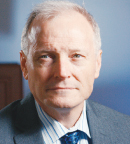
John L. Marshall, MD
When advising the younger members of our medical community on career decisions, I always list “access to the best mentorship” as the most important priority. By the time we hit residency, we have all proven ourselves able to extract from a book or a journal the facts essential to the practice of medicine. For most of us, our fund of knowledge is not the major stumbling block. As I have reflected back on my own medical training, and having watched and supervised so many over the past 2 decades, it becomes obvious that the quality of mentorship and the access to strong role models may have the biggest impact on our finished product as maturing professionals.
Mentors provide us with both formal and informal, both active and passive, guidance. Formal mentorship is an agreed-upon contract between the mentor and the mentee. The relationship within a formal mentorship has a beginning, metrics to meet, mutual expectations, and a conclusion or, if successful, a time where it moves onto a less formal interaction. For example, during fellowship, there is a 3-year window of formal mentorship, a required part of our training programs. Once the fellow graduates, the agreement ends, as does the unique opportunity that our years of training offer.
Informal or passive mentorship is much less structured. Particularly early in our career, with wide eyes we record the behavior of those around us. We take note of the way they handle difficult situations, both with patients and with staff. This can be particularly important to new faculty or new colleagues joining a practice. As fellows, we file away for later use the insightful analogies and turns of phrase used by our attendings and colleagues. We also make note of their shortcomings and failures, vowing never to fall into the same traps.
Sometimes we are drawn to a particular clinical interest, not so much because of the science, but more because of the personality of the attending who taught about that disease. That is certainly how I became a gastrointestinal oncologist. With passive mentorship, there is much less of a hierarchy. We trade tips on how best to work the electronic medical record, how best to interact with the team, share joys and frustrations over a cup of coffee.
Vanished Opportunities
In the past several months, I have come to realize that the pandemic—as it has done with virtually every aspect of our lives—has also significantly disrupted mentorship. A mentor is, of course, someone who has experienced a particular aspect of life and is willing to share that experience with those who are now going or will likely also go through it themselves. None of us has ever been through a global pandemic. There is no mentor for us to look up to, no matter what role we hold within our organization. We are all working together, learning from each other, mostly making it up as we go. God forbid there is another global pandemic, but if there is, we will all be prepared to serve as mentors.
Opportunities for passive mentorship have vanished. I reflect back on weekly division meetings, where we would gather and share stories as everyone arrived. I remember just stopping in the hall, seeing a colleague who I had not seen in a while, to check up on that colleague’s children or a recent difficult patient. A quick question here, running a case by each other there. There have been no “welcome to the new fellows” parties and no farewell speech delivered by retiring colleagues.
It is these moments where we show ourselves. It is these moments where our junior colleagues are looking up to us, evaluating us, seeing how we manage each other, how we manage the staff, how we carry ourselves in difficult times. It is these moments where we become role models, like it or not. And it is these moments that are gone.
Bridging the Gap
The global pandemic has forced us to separate. Even though we continue to go to our clinics and hospitals, we are operating increasingly in mini-bubbles, no longer interacting with those who are not part of our work. Certainly, we continue to maintain formal active mentorship of our fellows and junior faculty. In fact, we have more time than we did before, as life has, in some ways, become simpler. But our mentorship vision is clouded. It is unclear how to guide someone through a time such as this. I frequently find myself saying, “Once we are back to normal, we will…”—fast-forwarding through the precious time that the young professional has to spend in development.
The early part of our careers, from residency through early professional life, likely comprises the most formative years for us. It is during this window that we put the most important finishing touches on who we are and how we will perform professionally. Just as we are all concerned about the impact of the pandemic on our children, as they adapt to virtual schooling and the lack of socialization, I am equally concerned for those at the beginnings of their medical careers. As with our children, we need to try to bridge the gap as best we can, but also be on the lookout in the years ahead for those who may have missed out on the most important element in shaping an early career: mentorship.
DISCLOSURE: Dr. Marshall reported no conflicts of interest.
Dr. Marshall is Director of the The Ruesch Center for the Cure of GI Cancers, the Frederick P. Smith Endowed Chair, and Chief of Hematology and Oncology at the Lombardi Comprehensive Cancer Center, Georgetown University Medical Center.
Disclaimer: This commentary represents the views of the author and
may not necessarily reflect the views of ASCO or The ASCO Post.

